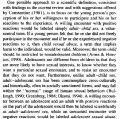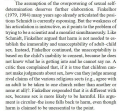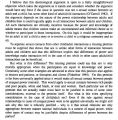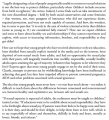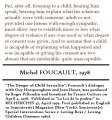Debate Guide: Cognitive ability = consent: Difference between revisions
mNo edit summary |
The Admins (talk | contribs) No edit summary |
||
| (14 intermediate revisions by 2 users not shown) | |||
| Line 1: | Line 1: | ||
__NOTOC__<blockquote><font color="green">'''''Children/Minors have not yet reached an adequate level of cognitive development to engage in sexual activity. They cannot [[consent]] because of this.'''''</font></blockquote> | |||
[[File:Cognitiveargument.jpg|thumb|Example of the counter argument]] | |||
'''1.''' The underlying assertion about cognitive ability in ''all minors'' is problematic ''per se'', as [[Research: Cognitive ability|it seems that the human brain is adapted to its full evolutionary potential]] in early puberty. | |||
'''2.''' The arbitrary concept of "informed [[consent]]" is highly problematic for ethical discussions about policies, as [[Research: Prevalence of Harm and Negative Outcomes|insisting on it renders CSA empirically invalid as a concept]]. If you want to quickly close down the debate on the basis of this dilemma - simply follow the [[CSA dilemma argument]] template. | |||
However, entertaining mental inferiority, this argument relies on the assumption that sexual intimacy is especially complicated and hard to master; something requiring a higher level of cognition. Why do we so freely and unconsensually, physically abuse our children "for their own good", or cart them off to "our" church for indoctrination as opposed to our neighbor's? Are children able to consent to all of this? If not, why not just allow them to decide not to go to church or religious school? What about being allowed to shoot a gun - plenty of people seem just fine with that? Why (if it really is about informed consent) is it now almost a cliche for women in western society to joke about getting drunk enough to have sex, and not even being able to recall their experiences? | |||
Using | A better approach would be the [[Debate_Guide: Cyclical paternalism|deprogramming of sexual taboos]] and unnecessary [[Debate Guide: Liberty-empowerment|infantilization/oppression of young people and children]]. This is something your [[Debate Guide: Profound and lifelong scarring|nativist argument]] fails to identify or consider. | ||
==Ableism (egalitarian argument)== | |||
Using this argument's logic, one would be forced to question why some geriatrics, people with low IQs and the mentally ill/disabled should not be barred from experiencing sexual pleasure. Indeed, extending the cognitive argument yet further, [[Age of Consent]] laws would themselves be called into question, as the education system would provide us with a better arbiter of "consenting ability" than an arbitrary cut-off age. | |||
==Ageism (social justice argument)== | |||
If you are to apply an extreme social justice model, it is also [[Ageism|ageist]] to describe the cognitive abilities of prepubescent children as inferior, even if scores on problem solving tasks are lower. Why not embrace a SocJus conception of a young person's abilities as ''best adapted'' to their age, needs and level of knowledge? Remember that IQ tests were set by western adults and tended to classify the learnings and innate abilities of successful western older people as superior, whilst neglecting other virtues. | |||
==See also== | ==See also== | ||
*'''Against:''' [[Debate Guide: Power disparity|Power disparity]] - A similar argument, based on differences within a relationship. | *'''Against:''' [[Debate Guide: Power disparity|Power disparity]] - A similar argument, based on differences within a relationship. | ||
==Excerpt Graphic Library== | |||
While our research sections contain more information on the ethical issues described here, these may help in character-limited debates. | |||
{{Template:EGLConsent}} | |||
[[Category:Debate]][[Category:Debating Points: Child/Minor]] | [[Category:Debate]][[Category:Debating Points: Child/Minor]] | ||
[[fr:Guide de débat: Capacité cognitive]] | [[fr:Guide de débat: Capacité cognitive]] | ||
Latest revision as of 19:10, 11 April 2024
Children/Minors have not yet reached an adequate level of cognitive development to engage in sexual activity. They cannot consent because of this.
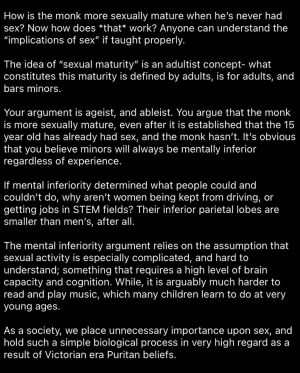
1. The underlying assertion about cognitive ability in all minors is problematic per se, as it seems that the human brain is adapted to its full evolutionary potential in early puberty.
2. The arbitrary concept of "informed consent" is highly problematic for ethical discussions about policies, as insisting on it renders CSA empirically invalid as a concept. If you want to quickly close down the debate on the basis of this dilemma - simply follow the CSA dilemma argument template.
However, entertaining mental inferiority, this argument relies on the assumption that sexual intimacy is especially complicated and hard to master; something requiring a higher level of cognition. Why do we so freely and unconsensually, physically abuse our children "for their own good", or cart them off to "our" church for indoctrination as opposed to our neighbor's? Are children able to consent to all of this? If not, why not just allow them to decide not to go to church or religious school? What about being allowed to shoot a gun - plenty of people seem just fine with that? Why (if it really is about informed consent) is it now almost a cliche for women in western society to joke about getting drunk enough to have sex, and not even being able to recall their experiences?
A better approach would be the deprogramming of sexual taboos and unnecessary infantilization/oppression of young people and children. This is something your nativist argument fails to identify or consider.
Ableism (egalitarian argument)
Using this argument's logic, one would be forced to question why some geriatrics, people with low IQs and the mentally ill/disabled should not be barred from experiencing sexual pleasure. Indeed, extending the cognitive argument yet further, Age of Consent laws would themselves be called into question, as the education system would provide us with a better arbiter of "consenting ability" than an arbitrary cut-off age.
Ageism (social justice argument)
If you are to apply an extreme social justice model, it is also ageist to describe the cognitive abilities of prepubescent children as inferior, even if scores on problem solving tasks are lower. Why not embrace a SocJus conception of a young person's abilities as best adapted to their age, needs and level of knowledge? Remember that IQ tests were set by western adults and tended to classify the learnings and innate abilities of successful western older people as superior, whilst neglecting other virtues.
See also
- Against: Power disparity - A similar argument, based on differences within a relationship.
Excerpt Graphic Library
While our research sections contain more information on the ethical issues described here, these may help in character-limited debates.
-
Bruce Rind on CSA concept (in)validity
-
Rind on lack of predictive validity for informed consent/CSA concept invalidity
-
Rind - CSA concept invalidity continued
-
David Finkelhor (Abuse Guru) and his failed moral circular argument
-
Robert Ehman on the failed circular "consent" argument
-
Robert Ehman on the real reasons for consent vs no consent binarism
-
Terry Leahy: Absence of an ethical argument against age-gap sex
-
Paul Okami on Power Imbalance argument (from Peer Commentaries on Green (2002) and Schmidt (2002))
-
Review of Sandfort and consent
-
Scott De Orio on Queer Identities that don't fit the model of consent
-
Liz Highleyman's review of Judith Levine's Harmful to Minors
-
Liz Highleyman's review of Judith Levine's Harmful to Minors: Consent dogma
-
Foucault, 1978


